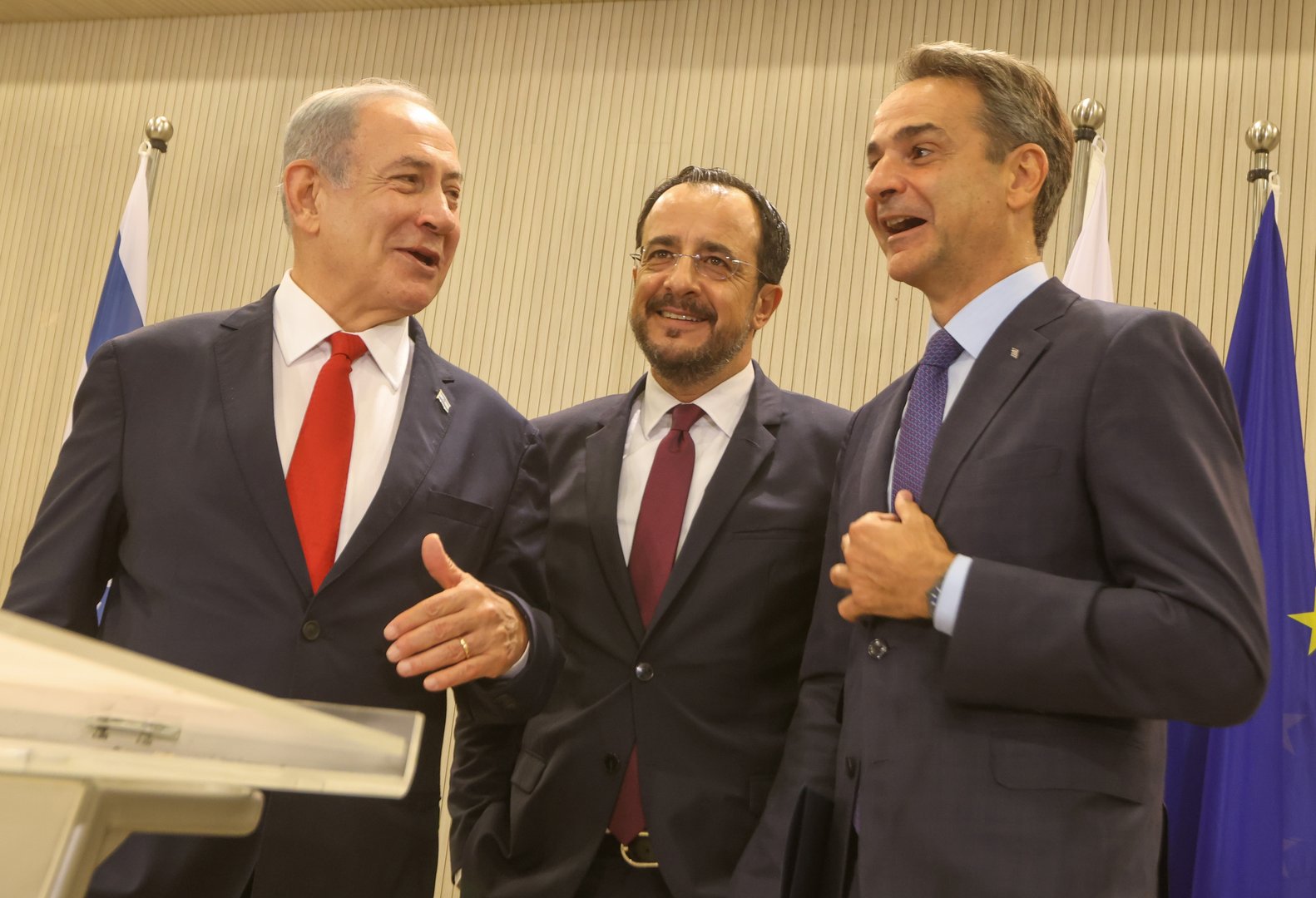Following three-way talks at the presidential palace on Monday, President Nikos Christodoulides, Israel’s Benjamin Netanyahu and Greece’s Kyriakos Mitsotakis reaffirmed their commitment to reinforce their cooperation in energy.
“We agreed that the energy sector, and in particular, natural gas, electricity and renewable energy, is a solid foundation for cooperation in the region, based on international law including the law of the sea and the respect of all states to exercise their rights in their respective Exclusive Economic Zone (EEZ) and continental shelf,” a joint statement read following the conclusion of the 9th trilateral summit.
Speaking at a press conference, Christodoulides called it “without a doubt a dynamic strategic alliance between partners of democratic values, with shared objectives, and which invest in a joint vision of stability, prosperity, and security in our region and beyond.”
He added: “In light of the growing need for energy diversification and interconnectivity, due to the geopolitical developments, we reaffirmed the common interest to advance prospects for a reliable energy corridor from the Eastern Mediterranean basin to Europe.”
Christodoulides, Netanyahu and Mitsotakis discussed the importance of further promoting projects such as the EuroAsia Interconnector, and possible future natural gas and hydrogen pipelines.
In his own remarks at the press conference, the Israeli leader reiterated his country’s interest in being a part of the mooted EuroAsia subsea electricity link.
“On the electricity connector…both Israel and Cyprus are islands. Crete, part of Greece, is an island,” said Netanyahu.
“There is an electricity connector that is being organised right now from mainland Greece to Crete to Cyprus. We would like to have it connected to obviously Israel, and possibly to the east of Israel, so that we can optimise the use of electricity. That’s something that we’re eagerly interested in pursuing. And we discussed the mechanism of how to advance this.”
Netanyahu imparted a sense of urgency regarding Israeli plans to export their natural gas to Europe, either through a pipeline to Cyprus, or an LNG facility here, or both.
“On gas, we’re discussing the possibilities that we’ll have to decide soon about how Israel exports its gas, and the same decisions have to be made by Cyprus. And we’re looking at the possibility of cooperating on this, those decisions will be made, I think, in the next three to six months – probably closer to three months.”
According to the joint statement, the three heads of state also underlined the value of the 3+1 format with the United States “which can offer tangible deliverables in the areas of energy, economy, climate action, emergency preparedness and counterterrorism. It was agreed to work together towards holding a ministerial 3+1 meeting later this year.”
Netanyahu meantime revealed plans to expand the 3+1 format to beyond the United States, to potentially bring India in.
“There’s something else that could develop, and we discussed it at great length,” commented the Israeli leader.
“There is now the possibility that we might have the expansion of the Abraham Accords to normalisation with Saudi Arabia. All three countries view that as a great possibility, but they also see that this could lead to a connection between India, the Arabian peninsula, Israel, Cyprus, Greece, Europe. There is a natural…there is a geographic connection but it could be also something that would lead to many rewards for our peoples and our countries.”
The possibility of inviting India’s prime minister to the next trilateral was discussed.
Likewise Christoulides said they reaffirmed “our strong commitment to the 3+1 format with the United States and agreed on the value of intensifying 3+1 cooperation, with concrete deliverables also with other countries and we talked specifically about India.”
Further, in the wake of the recent devastating wildfires in Greece, the three leaders reaffirmed their mutual commitment to assist each other in responding to emergencies – including using Artificial Intelligence systems for the early detection of fires.
Mitsotakis and Netanyahu were also briefed by Christodoulides on the latest developments on the Cyprus problem and welcomed his initiative to include an enhanced EU role in the efforts to resume negotiations.
Finally, Christodoulides, Netanyahu and Mitsotakis agreed that the next trilateral summit be held next spring in either Greece or Israel.
The three countries have built strong bonds over the years, and Netanyahu said one direct example of economic bonding was through food.
“We like your food,” he interjected off script as Mitsotakis finished speaking. “We like your dairy products. We like your yoghurt.”
Netanyahu said authorities would soon “open” the country’s dairy product market, which now protects local production with high import duties.
“We intend to open the dairy market very soon to Greek and Cypriot—and other—imports. May the best yoghurt win. You have a pretty good chance at winning.”
On Sunday, Christodoulides held a tete a tete with Netanyahu, during which he underlined the good relations with Israel.
“This is a friendship, a strategic partnership with depth and remarkable potential for further expansion that I am fully committed to,” he said.
“This commitment is anchored on the shared values and interests between Cyprus and Israel, but also on common challenges our two countries face, as well as the common goals we are determined to pursue, underpinned by our vision for regional stability and prosperity.”
Christodoulides added that the two leaders identified the next steps to take in key areas for both countries, namely energy, defence, cybersecurity, business, tourism, for which he said that the numbers of visitors to Cyprus are rising.
“You will encounter Israeli tourists wherever you go Benjamin,” the president told Netanyahu.







Click here to change your cookie preferences